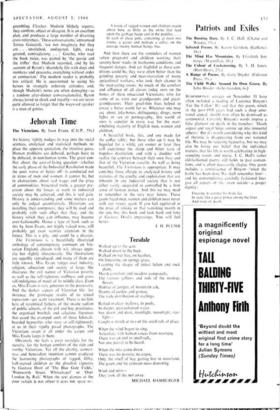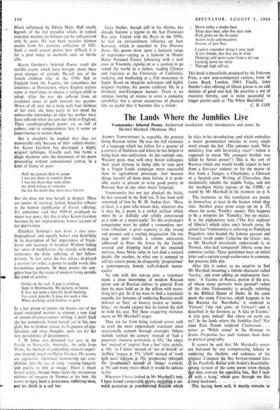Patriots and Exiles
Selected Poems. By Karen Gershon. (Gollancz, 18s.)
The Mind Has Mountains. By Elizabeth Jen- nings. (Macmillan, 18s.) The Colour of Cockcrowing. By T. H. Jones. (Hart-Davis, 25s.) A Range of Poems. By Gary Snyder. (Fulcrum Press, 35s.) The Child Walks Around Its Own Crave. By John Horder. (Giles Gordon, 6s.) RumExunt OWE services on November 11 have often included a reading of Laurence Binyon's 'For the Fallen.' It's sad that this poem, which in the post-1918 years had such a deep emo- tional appeal. should now often be dismissed as sentimental. Certainly Binyon's words impose a false glamour on death in the trenches: 'Death august and royal Sings sorrow up into immoi-tal spheres.' But its worth considering why this kind of rhetoric is disappearing from our national life. We may be rejecting hypocrisy, but we may also be losing our belief that the individual matters, that his life is worth celebrating in high- sounding words and music. J. C. Hall's rather old-fashioned poetry still holds to past conven- tions, and is often necessarily elegiac. One poem includes a reminiscence of Binyon—'when the battle has been done We shall remember him'-- and his contemplative, carefully fashioned lines give all aspects of life—even suicide—a proper dignity : Floating in summer his body lies
In state, like a great prince among the lilies And roses of death.
Much influenced by Edwin Muir, Hall recalls legends of the lost paradise which, in typical romantic manner, he believes can be rediscovered only by poets. His new book includes thirteen poems from his previous collection of 1951. Such a small output proves how difficult it is for a poet today to maintain such an heroic role.
Karen Gershon's Selected Poems recall the terrible events which have brought about these great changes of attitude. Herself one of the Jewish children who in the 1930s fled to England from the Fascists, she remembers her loneliness at Dovercourt, where English visitors came at meal-times to choose a refugee child to adopt. After the war she suffered from an irrational sense of guilt towards her parents. Worst of all, now she is forty with four children of her own, she must carry in her mind the unbearable knowledge of what her mother must have suffered when she sent her child to England. These autobiographical poems are so full of sadness and so compassionate that it seems an impertinence to review them.
But it shouldn't be implied that they are memorable only because of their subject-matter, for Karen Gershon has developed a highly original technique. Usually each line forms a Single rhythmic unit, the movement of the poem proceeding without conventional syntax, in a kind of litany of pain : Both my parents died in camps
I was not there to comfort them I was not there they were alone my mind refuses to conceive the life the death they must have known.
But she does not lose herself in despair. These are poems of survival, lyrical, beautiful tributes to the human significance of Jewish suffering. It's sometimes said that 1939-45 produced no major war poets, but this is what Karen Gershon becomes by her unpretentious, honest account of her deprivation.
Elizabeth Jennings's new book is also auto- biographical, and equally honest and disturbing in its description of her experiences of break- down and recovery in hospital. Without hiding her sense of humiliation, she records with much tenderness the daily suffering of her fellow- patients. In her verse she has always displayed a passion for order, a power to sculpt words into harmonious patterns. In these poems she top- ers how far the strain of modern living permits this kind of activity : Utrillo on the wall. A nun is climbing Steps in Montmartre. We patients sit below. It does not seem a time for lucid rhyming; Too much disturbs. It does not seem a time When anything could fertilize or grow.
In a last group of poems she breaks out of her Usual restrained manner to attempt a new had of stream-of-consciousness writing. I don't think she has completely found herself yet in this new ityle, but its broken syntax, its fragments of rcon- yersation and stray thoughts, open out for her new possibilities of development.
T. H. Jones was drowned last year in the Pacific at Newcastle, Australia. An exile froin Wales, his method of controlling modern experi- ence depends much on Dylan Thomas. His poems are aggressive, rhetorical, hammering out com- plexities into the joy of song—`rooting hungrily and angrily to find an image.' There is much lyrical gaiety, though Jones lacks• the miraculous richness of imagery in Thomas at his best. He seems to have been-a 'passionate, roltickinarman, and. his de"ath is a, sad loss. Gary Snyder, though still in his thirties, has already become a legend in the San Francisco Bay area. Linked with the Beats in the 1950s, he had an extraordinary influence on Jack Kerouac, which is recorded in The Dhartnu Bums. His poems draw upon a fantastic range of experience—acting as a lookout in Mount Baker National Forest, labouring with a trail crew in Yosemite, signing on as a seaman to go round the world in a tanker, reading Chinese and Japanese at the University of California, studying and meditating at a Zen monastery in Japan. Based on imagistic techniques and highly original rhythms, his poems celebrate life in a distinctly non-European manner. There is no anxious forcing of nature to serve a romantic sensibility, but a serene acceptance of physical life,• so joyful that it becomes like a vision : • Down valley a smoke haze Three days heat, after five days rain Pitch glows on the firrcones Across rocks and meadows Swarms of new flies.
I cannot remember things I once read A few friends, but they are in cities Drinking cold snow-water from a tin cup Looking down for miles • Through high still air.
This book is beautifully produced by the Fulcrum Press, a new non-commercial venture, from 16 Lawn Road, London, NW3. Finally, John Horder's slim offering of fifteen poems is an odd mixture of good and bad. He practises a wit of excessive brevity, and is more successful in longer poems such as 'The White Blackbird.'
C. B. COX






























 Previous page
Previous page